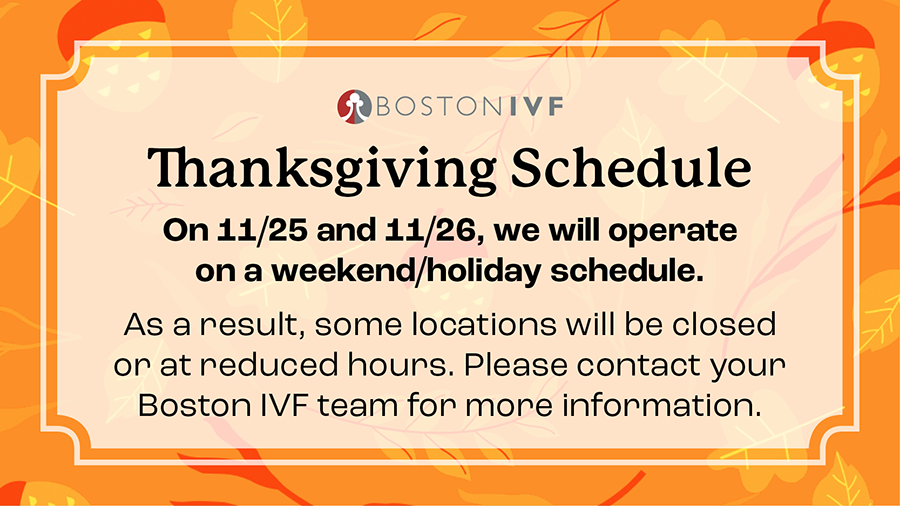
Maintaining Your Emotional Health During Infertility

Alice Domar, PhD founder of the Boston IVF Wellness Center - contributes to Psychology Today about dealing with emotional health during infertility treatments.
I published a study many years ago showing that women with infertility had equivalent levels of anxiety and depression as women with cancer, HIV+, and heart disease. Though this didn’t surprise me at all, it did represent a huge relief for my patients; it meant that the enormous distress they were feeling, the isolation they were experiencing from family and friends, was actually normal. Fast forward to the first surge of the pandemic; in the spring of 2020, several physician colleagues and I decided to survey infertility patients to see how COVID-19 was affecting them. We collected data on more than 2,000 women and the results again were not surprising to me; our patients rated the stress of infertility as equivalent to the stress of the pandemic.
Why? How could it be that struggling to conceive a baby could ignite similar feelings of anxiety as that of a global pandemic which was killing millions? Even when simply going to the grocery store felt life-threatening? The fact is procreation is the strongest instinct in the animal kingdom. Infertility represents a huge loss and can impact every aspect of an individual’s and couple’s life. It affects their relationship, their sex life, their relationships with family and friends, their job, their financial security, and more. Even if the diagnosis lies with their partner, women experiencing infertility are often blamed with comments: "Just relax.” “You are trying too hard.” “Try losing weight." "Try gaining weight.” "Exercise more.” "Exercise less.” These comments can insinuate that infertility is your fault and if you would just do something, anything, differently, you would get pregnant.
Here are some of the things I tell my patients.
- Infertility is a disease. If you are under 35 and have been trying to conceive for more than one year, or over 35 and have been trying to conceive for more than six months, you or your partner may require fertility treatment and I encourage you to request an appointment with a specialist. This is not in your head.
- Infertility can lead to psychological anguish. Most women with infertility report symptoms of anxiety and depression.
- Other people getting pregnant can cause feelings of jealousy, frustration, and a desire to avoid them. If you are experiencing sadness when others announce a pregnancy, this means one thing. You are normal.
- Friends and relatives are unlikely to really “get it” unless they’ve been where you are now.
Thus, the looming holidays may feel a bit daunting. For whatever reason, some relatives and friends seem to have no hesitation about commenting on your apparent inability to produce a grandchild, niece, nephew, playmate for their children, and despite a lack of a medical degree, freely offer advice with no basis in science. Here are some suggestions on holiday survival strategies:
- Tap into the suggestions on surviving the holidays with supportive others.
- Prepare witty “comeback lines” for intrusive or insensitive comments
- If you are indeed bothered by pregnant friends or relatives, or by babies and toddlers, scheduling visits later in the evening and make sure those you are visiting know that you are incredibly busy and can only stop by. Try to arrive late for events such as children opening presents.
- Make your own traditions instead of relying on being with others.
- If you are staying with family and the conversation or comments get to be too much for you, take a walk, develop a “headache,” lie down, help in the kitchen, or simply ask that the conversation move in a different direction. (Or memorize some of those witty comeback lines I mentioned earlier)
- Take advantage of travel discounts to take time away instead of being surrounded by people who might make you uncomfortable.
- Find joy in aspects of the holidays that don’t involve babies such as baking, volunteering, visiting elderly friends and relatives, visiting the church or synagogue or mosque of your childhood, reconnecting with old friends who don’t have kids, or watching those old nostalgic TV specials. Play holiday carols while you wrap. Find an organization that helps homeless families and build a food or gift basket.
Though this may represent one of the most challenging times in your life, you will get through it, and you are not alone. My hope is that by exploring and trying some of these suggestions, you can and will feel better.
I wish you and your family a safe and healthy holiday season; be self-protective, be giving, be well.




